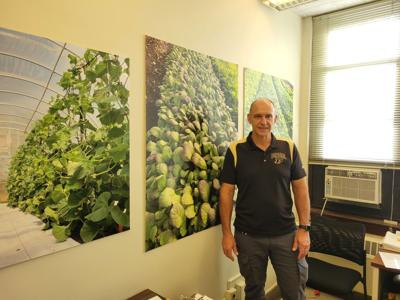Student farm shares vegetables, food with community
By MALINI NAIR AND SEAN MURLEY Staff Reporters

Petrus Langenhoven, one of the co-directors of the Purdue Student Farm, said after COVID-19, the farm needed to find a way to make new revenue after donating about $32,000 worth of vegetables.
When the dining courts switched to take-out because of COVID-19, Petrus Langenhoven, one of the co-directors of the student farm off Cherry Lane, said there was much less demand for fresh produce. With students gone, the farm had to find a way to shift income very fast.
Even though the dining halls weren’t open because of COVID-19, the farm decided to run as normal since the plants had already been planted.
“It’s not been necessarily a super tough transition, but it’s definitely been quick,” Christopher Adair, student farm manager, said. “I thought we had a great thing going with dining before COVID hit, and then when COVID happened, everybody was left scrambling … so we had to kind of transition almost immediately.”
"The Boilermaker Vegetable Season Pass directly supports the student farm's foundation: to teach students about small-scale agriculture, from growing it to selling it,” said Grace Moore, president of the Purdue Student Farm Club. “Not only does this program sell fresh, local vegetables to the community, but it also expands the possibilities for students like myself in the Purdue Student Farm Organization to get hands-on experience with local food systems.”
To participate in the CSA, individuals signed up and paid $460 ahead of time for 22 weeks of produce. Adair said the goal was to have 50 people involved in the program.
The next CSA, starting in June, hopes to have 100 participants. When sign-ups for the next CSA open, those interested can sign up for “The Boilermaker Vegetable Season Pass” via a Qualtrics link on the Purdue Student Farm website.
Reasoning for the dining court’s decreased purchases from the student farm hasn’t been provided by the chefs, Langenhoven said.
“The communication has been very haphazard,” he said.
He said some dining courts will still consistently buy from the farm, while others have stopped completely.
“COVID caused a lot of issues and a lot of problems so (the dining courts) never really fully got back on the horse of buying from us,“ he said.
Though overall buying has decreased, Wiley Dining court chef Darcy Smink said she still buys often from the Purdue Student Farm.
“I’m a big proponent of the farm,” Smink said. “I use it as much as I can in Wiley.”
The chefs aren’t mandated to buy from the farm, but she buys from it in a show of support.
Smink also said the dining courts were greatly affected by the pandemic, and those changes made it hard to use the fresh produce from the farms, which decreased overall purchases.
“COVID was hard because we weren’t all you can eat anymore,” she said. “Our menus were not as creative and as fun and as plentiful as we’ve been known for.
“Now that we’re kind of getting back out of things, and I can build real salad bars again, I’m doing what I can to bring it back.”
Some of the reasons Adair said the dining courts haven’t been buying as much is the farm doesn’t produce enough, which Smink confirmed. Both Adair and Smink said the dining courts have had labor shortages, which make it difficult to process the farm’s food.
While Smink buys from the farm, Adair said quality “for some (place) like the dining halls, that doesn’t entirely matter. We don’t always match up cleanly with what dining wants, because they’re huge, giant, black holes for vegetables and produce, and we can’t provide enough.”
Langenhoven said since the quality of the food from the farm is increased due to how locally it’s produced, as opposed to other larger chains.
“We don’t have to pick it early to ship it somewhere, so we can pick it when it’s mature,” he said. “That’s already a huge advantage and flavor boost for the consumer.”